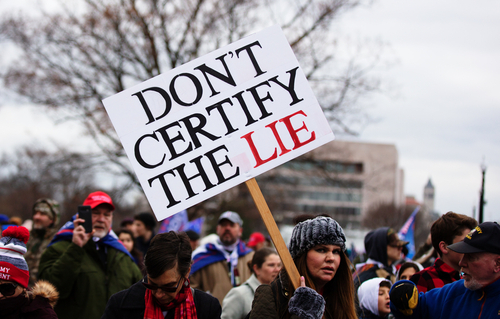
Across the nation, election offices are facing an unprecedented exodus of workers, a troubling development as elections approach. The necessity of ensuring that democratic processes run smoothly has long been the priority for these civil servants. Yet, in the face of increasing scrutiny and allegations surrounding the electoral process, many have chosen to step down from their roles.
This wave of resignations is a direct outcome of the heightened suspicions and intensified oversight by political factions and the public at large. Our electoral workers have traditionally operated in environments of trust and procedural integrity, but the recent climate has visibly shifted. The meticulous scrutiny has transitioned past critical watchfulness, transcending into a zone of harassment – an unfortunate reality for those committed to a thankless job.
JUST IN: Washington State votes to make it a FELONY to ‘harass’ election workers
This does not mean actual harassment but rather people observing election workers to ensure there is no fraudulent behavior.
Scary times! https://t.co/NXmN44fZZF
— Katie Daviscourt 🇺🇸 (@KatieDaviscourt) February 23, 2024
The impact is two-fold. Firstly, the loss of experienced staff could potentially destabilize the electoral process. The guidance of seasoned workers is indispensable; their nuanced understanding of the complexities of election administration is not easily replaced. As novices assume roles, the risk of errors inadvertently increases, which ironically dovetails back into fueling further skepticism about the election’s credibility.
Furthermore, this exodus highlights an unsettling trend toward politicization of what should be an impartial and straightforward civic duty. The increasing pressure on election workers, often coupled with inflammatory political rhetoric, feeds into a cycle where defending the probity of our democratic systems becomes challenging.
This election will be worse.
For who? And for what reason?
"Poll workers said because the internet is not working, therefore they had to take the ballots and put them into a separate bin." pic.twitter.com/klGfbectyI
— Xappeal (@_Tweetiez) February 25, 2024
In the face of such challenges, calls for reform echo from concerned citizens and lawmakers. The prevailing discourse suggests a need to fortify protections for election workers, instituting measures that insulate them from undue pressure and threats stemming from their professional obligations. Simplifying and streamlining election processes could also reduce burdens on workers and mitigate potential triggers for public doubts.
Moreover, there’s an urgent necessity to reaffirm public faith in electoral systems. Restoring confidence may require targeted campaigns highlighting the integrity and dedication of election personnel, backed by transparent oversight mechanisms that assure all stakeholders of the rigor and honesty of the electoral process.
In the interim, counties and states must scramble to replace their departing workforce, acknowledging the sacrifices made by those who have endured the tumult of recent election cycles. As a society, we must recognize the critical nature of their role and the need to support, rather than undermine, those who help uphold the core aspects of our democracy.
In conclusion, the resignation of election workers is symptomatic of a deeper challenge within our societal fabric. It’s imperative to address the root causes, safeguard the impartiality of election administration, and provide robust support to those on the frontline of preserving the democratic process. Only then can we ensure that our electoral system remains a paragon of fair play and justice, immune to the erosive forces of doubt and partisanship.












